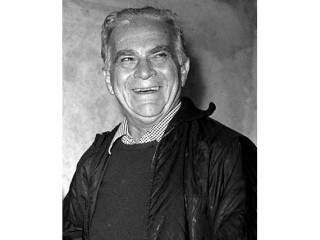
Edgar Snow biography
Date of birth : 1905-07-19
Date of death : 1972-02-15
Birthplace : Kansas City, Missouri, U.S.
Nationality : American
Category : Famous Figures
Last modified : 2011-03-05
Credited as : Journalist and author, interviewed Mao Zedong, Red China Today (1971)
An American journalist and author, Edgar Snow acquainted the Western world with the Communist movement in China and was for many years the only American writer with regular access to Chinese Communist leaders.
The son of a printer and editor, James Edgar, and Anna Catherine (Edelman) Snow, Edgar Parks Snow was born on July 19, 1905, in Kansas City, Missouri. In 1923 he attended Kansas City Junior College; then transferred to the University of Missouri, from which he graduated in 1926; and in 1927 went to Columbia University's School of Journalism for a year. Eager to travel, he began work as a foreign correspondent for the New York Sun in 1928, visiting Hawaii and Central America. Snow then went to China, where he remained for the next 12 years. Travelling extensively, Snow became acquainted with many of China's future leaders and wrote many firsthand reports of major news events, including the Sino-Soviet hostilities in Manchuria during 1929 and 1930, the agrarian revolt in Indo-China in 1930, and the Tharawaddy uprisings against British rule in Burma.
In 1936, when the regime of Generalissimo Chiang Kaishek was reporting the rumor that Mao Tse-tung had died, Snow trekked across China, slipped through the Nationalist lines, and crossed the hills of Shensi to enter a village just south of the Great Wall where he met with the Red Army that had just concluded its historic Long March from southern China. For the next five months he travelled with the Chinese Red Army and lived with Mao in the caves of Yenan. His articles and photographs for various publications broke a news blockade on the Communist leaders and on their war tactics and objectives.
The publication in 1937 of his book Red Star Over China quickly earned Snow the reputation of the Western world's expert on Communists in China. An international bestseller, Snow's prophetic account of the guerrilla movement and its leaders predicted that they would ultimately win the civil war. He reported with exuberance on the discipline and idealism of the insurgents; he recounted Mao's version of his pre-1936 career and of the Communist program for China; he suggested that Mao's policies enjoyed widespread support in the countryside; and he depicted the Communists as a formidable nationalist and anti-Japanese force, not the bandits claimed by Chiang Kai-shek.
Another prophetic work, The Battle for Asia, published in 1941, predicted many of Japan's military victories and foresaw the challenge to the whole colonial system that would result from World War II. Although not a Communist himself, Snow actively sympathized with the Communist movement in China. During the Cold War, he was blacklisted in the United States and had to earn his livelihood on free-lance sales to foreign journals. He continued to travel extensively in China after the successful Communist revolution in 1949, and Snow was the only American journalist to be granted frequent interviews with Chairman Mao and Premier Chou En-lai. His favorable impressions of the new society in China and of the progress made toward improving the quality of Chinese life were published in 1962 in The Other Side of the River.
In 1970, during his last trip to China, the Chinese showed their admiration for Snow by inviting him to stand atop the Tienamen Gate in Peking with Chairman Mao during the celebration of National Day. On this final visit, moreover, Chow told Snow that "the door is open" for improved relations with the United States, hinting that the Chinese leaders would welcome a summit meeting with President Nixon. When the president began to prepare for his visit to the People's Republic of China, Snow was in Switzerland dying of cancer. Premier Chou En-lai sent a special medical team to attend his friend, but Snow died on February 15, 1972, almost at the very time of President Nixon's triumphant arrival in Shanghai.
Snow's final book, The Long Revolution, an account of his last trip to China and his many talks with Mao, was published posthumously in 1972. He was survived by his second wife, Lois Wheeler, a stage and film actress whom he married in 1949, and two children of his second marriage, Sian and Christopher. Wanting to belong partly in China and partly in the United States, Snow directed that his remains rest in a garden at Peking University and also near "the Hudson River, before it enters the Atlantic to touch Europe and all the shores of mankind of which I felt a part."
Snow's major writings on China include Red Star Over China (1937), Random Notes on Red China (1957), Journey to the Beginning (1958), The Other Side of the River (1962), Red China Today (1971), and The Long Revolution (1972). He also authored The Battle for Asia (1941), People on Our Side (1944), The Pattern of Soviet Power (1945), and Stalin Must Have Peace (1947). Biographical data appear in his obituaries in the New York Times (February 16, 1972) and Nation (February 28, 1972).
















